English-language schools fall short with qualified teachers
Updated: 2015-06-08 04:30
By WANG RU in Beijing(China Daily Latin America)
|
||||||||
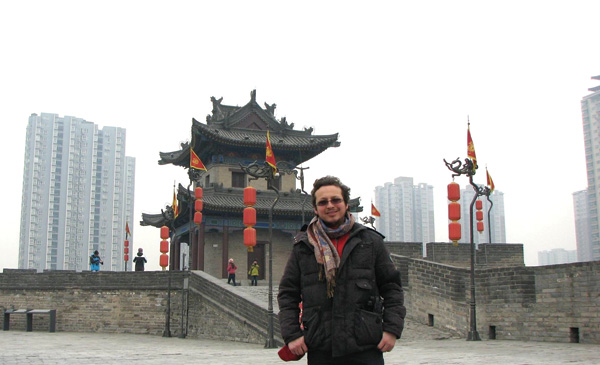 |
|
Mahoma Iza Villalba visited an ancient building in Xi'an, capital of Northwest China's Shaanxi province, in January. PROVIDED TO CHINA DAILY |
Mahoma Iza Villalba gave up his stable high school science teacher job in Mexico to teach in China, and did not expect to hit a rough patch as soon as he arrived.
The employer of a private English-teaching institution in Changchun who promised him a job and convinced him to fly all the way to Jilin Province by himself reneged on her word and left him alone in an unknown country without even a work visa.
The absence of standardized procedural norms during the school's recruitment process struck him as unbelievable.
"Back then only a resume was needed for a foreigner to find a job as an English teacher," he said. "Both proper background check for potential candidates and protection of foreign employees were lacking in these companies."
Mahoma's unfortunate encounter with the irresponsible employer is not uncommon in the market for foreign teachers, but things are slowly improving, especially with stricter state regulations imposed on foreigners’ employment.
According to Beijing Bureau of Foreign Experts Affairs, approximately only 500 registered institutions in Beijing are legally qualified to issue "expert certificates" to foreign teachers, an incredibly low number considering more than 7,000 ESL institutions whose actual employment of foreigners remain unregulated.
To combat this problem in the market, last September Beijing took the lead in further driving up the threshold for foreign teachers. Beijing's Bureau of Social Security, Office of Foreign Affairs, and Board of Education jointly announced the new rules foreign personnel's eligibility in Beijing
The policy adds a bachelor degree or a standardized teaching certificate as well as at least five years of working experience other than English-teaching to the minimum requirements for foreign teachers to legally stay and teach in Beijing.
Other provinces also strengthened their efforts to punish unlawful employment in the relevant area. Last month, two American teachers Jeffrey James and Thomas Micahray were each fined 5,000 yuan for illegally teaching at a Tangshan English institution while holding "expert certificates" invalid outside Tianjin or Hangzhou.
However, Mahoma voiced some concerns for these policies' insubstantiality given these ESL centers' structural problems that he has previously witnessed during his stay in China.
His first job here was as an afterschool ESL tutor at a private English-language educational institution in Jilin that specializes in hiring foreigners to train their elementary and middle school students.
"Language schools like this are not designed to improve their students' English level in an effective manner," he explained, basing it on his personal experience. "Teachers are expected to play games with the children more than they teach academic materials. I believe that these institutions intentionally delay their students' learning progress to guarantee long-term revenue flow from each customer."
Li Xinhan, a parent who sent her daughter to study at an ESL English-training center in Tianjin, also pointed to the company's operation mode instead of foreign teachers' qualifications for the reasons behind her daughter’s slow progress.
She found the school online through a piece of well-designed advertisement and hoping for a significant improvement in her daughter's grade, reluctantly paid a tuition rate as high as 80,000 per subject.
Nevertheless, the result was disappointing.
"The school only concentrates on its multifarious media campaigns to solicit more customers and never pays attention to the actual teaching", Li said indignantly. "Foreign teachers there are neither supported nor supervised by the school administration."
Moreover, there are worries that foreigners who actually reach all these new requirements would not want to teach at ESL schools for a salary of only about 4,500 yuan per month due to the amount of money that they previously invested in themselves to satisfy these stringent conditions. A teaching certificate alone costs around 30,000 yuan to obtain. China’s huge demand for relatively cheap ESL English teachers would thus go unmet.
Data from Bureau of Foreign Experts Affairs suggest that the current Chinese market needs at least 100,000 foreign teachers while there are only about 30,000 foreign experts whose qualification is legally recognized by the state.
Mahoma shared his insight on this shortage of qualified foreign teachers.
"Traditionally, ESL teachers are backpackers who teach to travel, and though with little professional experience, they are still competent enough to finish the easy job responsibilities given to them and are suitable choices for students who cannot afford a systematic education at a registered international school."
Bruce Cooper, the founding principle and economics instructor of Tianjin Foreign Language School's AP Center, expressed similar opinions.
"China is becoming an increasingly mature market. It is more difficult now than ever for ordinary foreign teachers to seek employment here and in turn for schools to lawfully hire sufficient employees to ensure successful operation."
Cooper also revealed the difficulty of hiring competent foreign teachers from abroad despite the more rigid regulations.
"There is no way to conduct in-person interviews during the competence evaluation, so you have put all your faith in the applicant's resume," Cooper said. "Inevitably you get teachers who are not as experienced in their subject areas as they should be and have to let them go."
A former math teacher of the school who came from Romania to seek an educational career at his school, for example, had all requisite materials but still had her contract terminated after only a few months of employment because of her incompetence in real-life teaching.
Zhang Yilin, a student at a Tianjin ESL learning center, argued to the contrary and insisted on rigorous enforcement of state control to most efficiently eliminate unqualified foreign teachers despite the possibility of having to pay even higher tuition rate.
"My current foreign tutors are barely qualified to teach, and my parents would be willing to pay more for teachers who at least possess some basic educational skills," said Zhang.
She told China Daily that most foreign employees at her school are not even native English-speakers but rather are international students in China who originally come from Russia, Philippine, or Japan. "Their lack of vocabularies is striking," Zhang said. "My teacher does not even know what the word 'halo' means."
Cheng Yilun contributed to this story.
wangru@chinadaily.com.cn

 Rescuers mourn victims on seventh day since Eastern Star disaster
Rescuers mourn victims on seventh day since Eastern Star disaster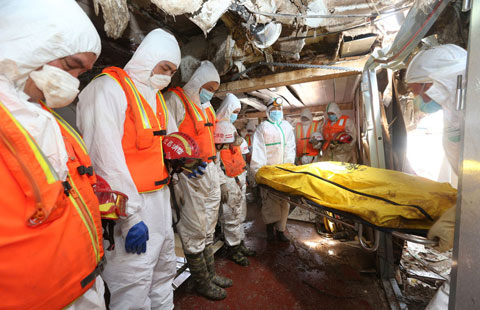
 Rescuers enter Eastern Star hull in search efforts
Rescuers enter Eastern Star hull in search efforts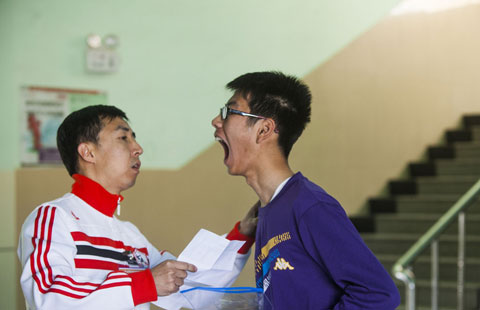
 Gaokao held across China
Gaokao held across China
 Man sues actress for staring at him
Man sues actress for staring at him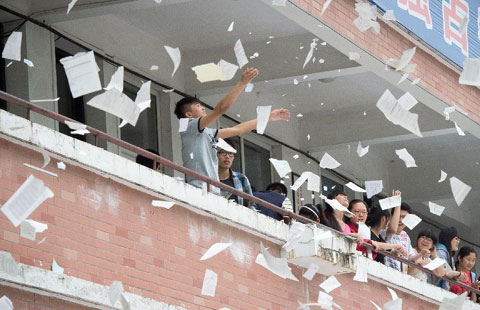
 Students prepare to take national college entrance exams
Students prepare to take national college entrance exams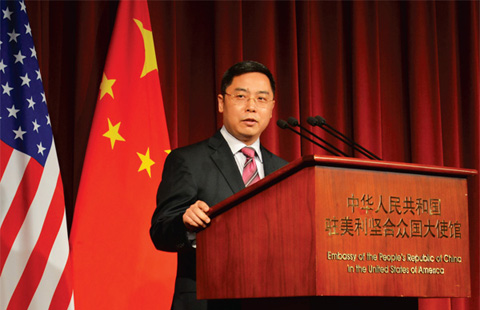
 Across America (May 29- June 4)
Across America (May 29- June 4)
 Operation underway to turn the ship over
Operation underway to turn the ship over
 Prayers held for ship passengers
Prayers held for ship passengers
Most Viewed
Editor's Picks

|

|

|

|

|

|
Today's Top News
China gives its yuan to Broadway
Heavyweight Zhang wins unanimous decision
China mourns Yangtze shipwreck victims as search continues
China signs $50m agreement with FAO to support developing countries
9.42 million students sit national college entrance exam
Death toll jumps to 396
as hopes of finding any
survivor in cruise fade
China, Japan reopen finance talks after delay over sour relations
Hacking claim isn't responsible, Beijing says
US Weekly

|

|






